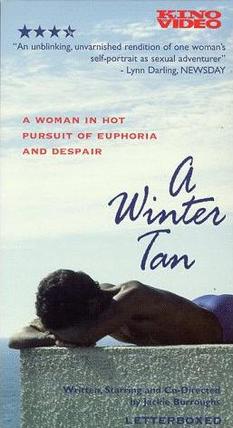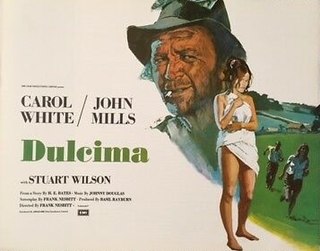Related Research Articles
Road to Avonlea is a Canadian television series first broadcast in Canada between January 7, 1990, and March 31, 1996, as part of the CBC Family Hour anthology series, and in the United States starting on March 5, 1990. It was created by Kevin Sullivan and produced by Sullivan Films in association with the CBC and the Disney Channel, with additional funding from Telefilm Canada. It follows the adventures of Sara Stanley, a young girl sent to live with her relatives in early 20th-century eastern Canada. It was loosely adapted from novels by Lucy Maud Montgomery, with many characters and episodes inspired by her stories.

Jacqueline Burroughs was a British-born Canadian actress. Burroughs starred in over 100 films and television shows over her career, including Heavy Metal, The Care Bears Movie, The Grey Fox, and Anne of Green Gables, and was best known for her role as Hetty King in the TV series Road to Avonlea.

Sook-Yin Lee is a Canadian broadcaster, musician, film director, actress and multimedia artist. She is a former MuchMusic VJ and a former radio host on CBC Radio. She has appeared in films, notably in the John Cameron Mitchell movie Shortbus.

John Colicos was a Canadian actor. He performed on stage and television in the United States and Canada.

Anne of Green Gables is a 1985 Canadian made-for-television drama film based on the 1908 novel of the same name by Canadian author Lucy Maud Montgomery, and is the first in a series of four films. The film stars Megan Follows in the title role of Anne Shirley and was produced and directed by Kevin Sullivan for the Canadian Broadcasting Corporation. It was released theatrically in Iran, Israel, Europe, and Japan.
The Earle Grey Award is the lifetime achievement award for television acting of the Canadian Screen Awards, and its predecessor the Gemini Awards. It can be presented to an individual or collaborative team, and may be presented posthumously.

Molly Parker is a Canadian actress, writer, and director. She garnered critical attention for her portrayal of a necrophiliac medical student in the controversial drama Kissed (1996). She subsequently starred in the television thriller Intensity (1997) before landing her first major American film role in the drama Waking the Dead (2000). She gained further notice for her role as a Las Vegas escort in the drama The Center of the World (2001), for which she was nominated for the Independent Spirit Award for Best Female Lead.

Joshua Then and Now is a 1985 Canadian film and a TV mini-series, adapted by Mordecai Richler from his semi-autobiographical novel Joshua Then and Now. James Woods starred as the adult Joshua, Gabrielle Lazure as his wife, and Alan Arkin as Joshua's father. It was directed by Ted Kotcheff who had previously directed Richler's The Apprenticeship of Duddy Kravitz.
The Academy of Canadian Cinema & Television presents one or more annual awards for the Best Screenplay for a Canadian film. Originally presented in 1968 as part of the Canadian Film Awards, from 1980 until 2012 the award continued as part of the Genie Awards ceremony. As of 2013, it is presented as part of the Canadian Screen Awards.

A Winter Tan is a 1987 Canadian drama film. Based on the book Give Sorrow Words by Maryse Holder, the film stars Jackie Burroughs as Holder.

The Ernie Game is a 1967 Canadian drama film directed by Don Owen.

Dulcima is a 1971 British drama film directed by Frank Nesbitt. It was entered into the 21st Berlin International Film Festival. The story revolves around a love triangle: a farmer, his housekeeper and the handsome neighbour.
Between Friends is a 1973 Canadian crime film directed by Donald Shebib. It was entered into the 23rd Berlin International Film Festival, and was featured in the Canadian Cinema television series which aired on CBC Television in 1974.

Nowhere to Hide is a 1987 thriller film directed by Mario Azzopardi. It stars Amy Madigan, Daniel Hugh Kelly and Robin MacEachern, as a family on the run from corrupt Marine officers. It also stars Michael Ironside, John Colicos, Maury Chaykin and Clark Johnson.
Unfinished Business is a 1984 Canadian drama film directed by Don Owen. It is a sequel to Owen's influential 1964 film Nobody Waved Good-bye.
Charles "Chuck" Shamata is a Canadian actor.
Princes in Exile is a 1990 Canadian feature-length coming of age drama about a group of young people at a summer camp for kids with cancer, directed by Giles Walker, written by Joe Wiesenfeld, based on a novel of the same name by Mark Schreiber. The film follows a 17-year-old protagonist, Ryan, played by Zachary Ansley, and the friends he makes over the summer. The film title is derived from the joking term the film characters adopt to describe themselves. Other characters in the film include Robert, the camp's daredevil, who suffers from Lymphoid leukemia, as well as Holly, a girl who has lost part of her leg, who becomes emotionally involved with Ryan. Chuck Shamata plays the camp director. The 103-minute film was produced by John Dunning and was a co-production of Cinepix, the Canadian Broadcasting Corporation and National Film Board of Canada. It was released theatrically in the United States by Fries Entertainment.
The Running Man is a Canadian television film, directed by Donald Brittain and broadcast in 1981 as an episode of the CBC Television drama anthology For the Record. It was Brittain's first narrative fiction film in a career making documentary films, and the first Canadian television film ever to explicitly address the subject of homosexuality.
The 21st Canadian Film Awards were held on October 4, 1969 to honour achievements in Canadian film. The ceremony, attended by 1,200 people, was hosted by broadcaster Fred Davis.
Chautauqua Girl is a Canadian romantic drama television film, which was broadcast by CBC Television in 1984. Written by Jeannine Locke and directed by Rob Iscove, the film is set in 1921 and stars Janet-Laine Green as Sally Driscoll, a woman who is touring Western Canada as a representative of the travelling Chautauqua organization; arriving in the small town of Fairville, Alberta, she finds the town unprepared for the upcoming event but meets and falls in love with Neil McCallum, a widowed farmer who is running as a United Farmers of Alberta candidate in the imminent 1921 Alberta general election.
References
- 1 2 "Television highlights". Ottawa Journal , October 8, 1969.
- ↑ "HEBates.com". Archived from the original on 2021-09-11. Retrieved 11 September 2021.
- ↑ "'Best Damn Fiddler' Wins Film of the Year Award". Ottawa Journal , October 6, 1969.